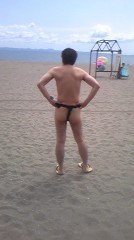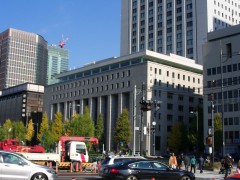07 December 2011
Book on US Occupation of Japan after WW2 "Washington Heights"
A book "Washington Heights" is written by a female journalist, AKIO Satoko. She studied how the United States government managed occupied Japan after the country defeated his enemy. Then she spotlighted on "Washington Heights," which was exclusive residential area for the U.S. military personnels located in the center of Tokyo. The area was built after the war was over by the order of U.S. occupational force. Before the war, it was Japanese imperial army's property. It was located next to Meiji Jingu Shrine, memorial shrine for the Meiji Emperor (crowned between 1868-1912) .
After the Olympic the place turned to famous public park, Yoyogi Park and Japan's public broadcasting station, NHK building.
The book mainly described episodes of Japan's Occupied era (1945-1952) and economic booming era until Tokyo Olympic in 1964. When the U.S. force arrived in Japan, they occupied many places in Tokyo for its administration purpose. The General Head Quarter was placed in Dai-ichi Life Insurance Building near the Imperial Palace.
But they needed housing for soldiers and staff working for the G.H.Q. So they ordered the Japanese government to build housing block for Americans, requiring facilities and equipment equivalent to American standard of that time. That was the hell of a big job for the Japanese government because the places were all burnt down, and shortage of goods.
The Washington Heights, American style housing provided Japanese new culture and lifestyle. Because American personnels and their family living there wanted entertainment, many Japanese entertainers were recruited for performances for them. That caused a big entertainment icon, Journey's Production, which has released many great talents to Japan's showbiz until now. Morie Hana, a famous Japanese fashion designer opened clothing shop for women living in the residential area. She studied most sophisticated western clothing during that time. As for food culture, Japanese learnt fresh vegetable farming to meet demands from Americans. Japanese learnt how to farm vegetable for the fresh salad taking sanitation into account.
As for how Americans thought about occupying Japan was described as well.
When Americans first arrived in Japan after the war, they were surprised because their former enemy citizens were so friendly to them. Many Japanese in fact, felt liberated when the war was over. So occupation worked more smoothly than expected. The U.S. occupation in fact provided democratization of Japan including women's suffrage, reform of biased wealth distribution towards elite class. The U.S. aim was to demilitalize Japan so they thought cracking down feudal customs and elite class power was best way to do.
The U.S. at that time were so worried about communist threat from Soviet Union. So they treated Japan nicely although Japan was a former enemy.
Most interesting episode noted in the book was that a former Japanese military officer met Afro-American man working as lower rank staff of G.H.Q. who told him that Blacks were glad when Japan attacked Pearl Harbor.
The conclusion of the book was U.S. occupation provided Japan great things but we have to remember Japan has been controlled by U.S. since that time and even after Japan recovered independence, we are always facing indirect occupation by the U.S. such as military bases in Okinawa, Tokyo, and diplomatic pressure to liberalize trade and commerce.
Recently the U.S. hegemony has been on the edge as you see "Lehman Shock" and "Occupy Wall Street" movement. The U.S. can no longer function as a role model for Japanese.
Thanks to the U.S. we could have developed the nation acquiring many great things from them but it is time we develop us ourselves in our own way.
22:01 Posted in Books, Culture, Tokyo Life, US-Japan relationship, USA issues | Permalink | Comments (0) | Tags: history, military
14 August 2011
Book: "Letters from Berlin" written by a Japanese woman who lived in West Germany during Chernobyl crisis
The book is letter format. A writer named Chikako Yamamoto's wrote her experience of life in West Germany during Chernobyl nuclear crisis between April 1986 and 1989.
During that time she lived in West Berlin. What she experienced had many similarities to my current life in Tokyo, or surprisingly even worse. Tokyo is 220 kilometers away from Fukushima, but West Berlin is 1200 km away from Chernobyl. But radioactives Germen had to deal with was the same or even worse than Fukushima. Is it because Chernobyl disaster was much worse and more wide-spread or what we've been told since Fukushima crisis was censored by the authorities?
The life in West Germany was dramatically changed since Chernobyl accident occurred. The newspaper was occupied by radioactive related matters.
In contrast as time passed by, people tried to adopt to such changed environment and not to pay attention to serious matters although food they ate had been kept contaminated.
West Germany at that time censored the reports on radioactives and supressed anti-nuke activities because at that time West Germany took pro-nuke policy. But some citizens stood up and started to fight against oppression.
Similar phenomenons have been happening here in Japan.
However, because this is quarter century after Chernobyl, we may have been a little wiser, I hope.
Japanese Prime Minister, Naoto Kan declared "Less dependency on nuclear energy" policy on August 6, the day of Hiroshima nuclear bomb day. It is like modeled after Germany's decision of abandoning all nuke plants in that country by 2012.
Now only 1 third of Japan's nuclear power plants are operated currently. No re-operation is scheduled at this point. Local governments of where nuke plants are located are very reluctant to OK re-operation.
Japan's Parliament decided to pass the law that promotes more use of renewable energy, so called FIT (Feed in Tarrif). This is modeled after Germany's system as well.
We have to learn a lot from Germany's experience, like we did in the past such as imperial constitution and ground force military system in late 19th century and how to recover relationship with neighboring nations which we invaded during the second world war.
Deutschland, be our good model. Danke!
14:14 Posted in Books, Deutschland, Ecology, Japan News | Permalink | Comments (0) | Tags: nuclear power, fukushima
27 April 2010
Book "America's Poor Class Education field report" by Soichi Hayashi
The author of the book is Japanese sports journalist who worked as a part-time teacher in a chartered high school in Reno, Nevada 2006.
The students come from very poor families and dropped out from regular school. Most of them live with single parents.
They do not have good knowledge nor manner. They grew up in a very bad environment where parents don't have money and time to take good care of them.
The author witnessed the reality of America's poor bottom class. The author himself grew up in the similar environment in Japan so he somehow felt mutual with them. He had guts and loved students so he worked hard to get them know how wonderful and necessary it is for them to learn new things so that they can make a new way of living getting out from ghetto they were in.
The author taught them Japanese culture as Sumo, Manga, fairy tales. On one class he told them Japan's most famous fairy tale "Urashima Taro" a story of a fisherman who saved a turtle from bullying by children on the beach and later be guided by the turtle to the palace under the sea. But when he came back to the ground, so much more time than he felt had passed, he had no one to know him.
He asked the students what they think about the story. Students were very much impressed by that and one of them replied to him "the story gave us a lesson that we shouldn't expect return from good thing we do."
Recently in Japan, books on America's poor class have been published like the below ones I've already introduced on this blog.
Super Class society, The truth of America
Empire of Poverty (Hinkon-Taikoku), America!
This one is especially unique since that is hands-on experience of the author as foreign teacher who taught his home culture to troubled students abroad.
I wonder if this book is made into film some day. It should be like "Freedom Writers" or "Take the lead."
23:42 Posted in Books, Society, USA issues | Permalink | Comments (0) | Tags: education, poverty
24 December 2009
Novel "Kokoro" by Natsume Soseki
The story was written by Japan's infamous novelist, Natsume Soseki. The novel was released in early 20th century. The novel starts with the sentence "I always called him "Sensei (Sir)." It is a memoir of a man who met a cool older guy on the beach. When the two guys first met, they both wore swim suits like this.

14:49 Posted in Books, Culture | Permalink | Comments (0) | Tags: gay, literature







